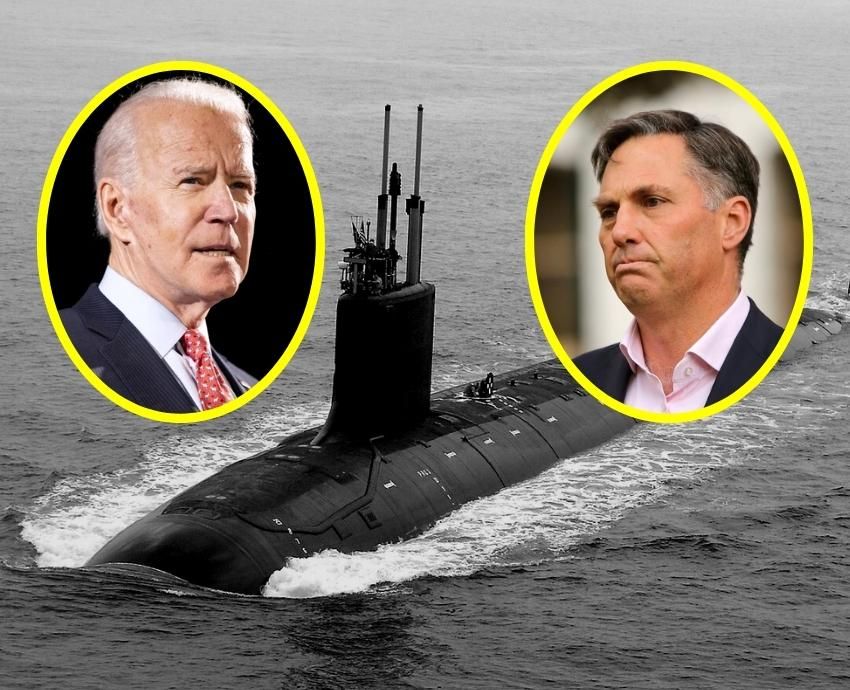
Australian government undertakings regarding the AUKUS security pact are monumental: increased militarisation on the home front; the co-opting of the university sector for war-making industries and defence contractors; and the capitulation and total subordination of the Australian Defence Force to the Pentagon.
There are also other, neglected, dimensions: the Commonwealth’s failure, as yet, to establish a viable, acceptable site for the long-term storage of high-grade nuclear waste; the uncertainty about where the submarines will be located; the absence of skills in the construction and operational level in Australia regarding nuclear-powered submarines; and, fundamentally, whether a nuclear-powered Australian-UK-US submarine (AUKUS SSN) will ever see the light of day.
Another obstacle is the rumbling concerns from the US about transferring submarines from the US navy. These are summarised in the 60-page Congressional Research Service report, released on May 22, outlining the background and issues for US politicians regarding the procurement of the Virginia (SSN-774) submarine.
It outlines 10 issues of concern. “One issue for Congress is whether to approve, reject, or modify DOD’s AUKUS-related legislative package for the FY2024 NDAA [National Defense Authorization Act] sent to Congress on May 2, 2023.”
This includes requested authorisation for the transfer of “up to two Virginia-class SSNs to the government of Australia in the form of sale, with the costs of the transfer to be covered by the government of Australia”.
After listing the concerns the report makes it clear that they are not exhaustive. They are bound to send shivers down the spine of the federal government’s planning establishment.
For instance, there is the question as to whether the transfer of the Virginia-class boats should be authorised as part of the 2024 financial year, or deferred “until a future NDAA”.
There is also the matter of how many submarines should be part of the request; whether it remains up to two, as per the current request, or larger numbers. With those numbers also comes the dilemma as to what vintage they will be: those with less than 33 years of expected service life, or newly minted ones with the full 33-year period of operational service. (We can hazard a guess.)
The issue of cost also looms large. What will Australia pay for the Virginia-class vessels and, furthermore, what amount is needed as “a proportionate financial investment” in Washington’s own “submarine construction industrial base”.
This is all good news for US shipbuilders, which will be receiving funds from the Australian purse to accelerate their ship-building efforts.
Other issues suggest questions on operational worth. What, for instance, would be the “net impact on collective allied deterrence and warfighting capabilities of transferring three to five Virginia-class boats to Australia while pursuing the construction of three to five replacement SSNs for the US Navy”?
The transfer of US naval nuclear propulsion technology would come with its “benefits and risks”, it states, and should also be cognisant of broader implications to US relations with countries in the Indo-Pacific, not to mention “the overall political and security situation” in the region.
The report takes note of sceptics who claim this “could weaken deterrence of potential Chinese aggression if China were to find reason to believe, correctly or not, that Australia might use the transferred Virginia-class boats less effectively than the US Navy would”.
This is a damning suspicion.
Will the Australian navy have capacity and skills not only to use weaponry in its possession, but to refuse to comply with US wishes in a future conflict?
From the perspective of Australia retaining sovereign decision-making capacity over the use of the vessels, the report is interesting. It states: “Australia might not involve its military, including its Virginia-class boats, in US-China crises or conflicts that Australia viewed as not engaging important Australian interests.”
The report noted defence minister Richard Marles’ remarks in March that were a specific concern for Congress: he said “no promises” had been made to the US “that Australia would support the United States in a future conflict over Taiwan”.
This is an admission that members of the US Congress may well be pushing for a quid pro quo: we authorise the boat transfer; you duly affirm your commitment to shed blood with us in the next grandly idiotic battle.
There is also a point made about whether an individual SSN AUKUS should even be built.
The report said sceptics might argue that it would be preferable that US nuclear submarines “perform both US and Australian SSN missions while Australia invests in other types of military forces, as to create a capacity for performing other military missions for both Australia and the United States”.
This is exactly the kind of rationale that will confirm the holing of Australian sovereignty (not that there was much to begin with).
The voices marshalled against AUKUS will be able to take heart that Congress may, whatever its selfish reasons, become an agent of obstruction.
President Joe Biden, his successors and the otherwise fractious electoral chambers agree on one thing: America first, followed by a gaggle of foolish allies holding the rear.
[Binoy Kampmark lectures at RMIT University.]